Manifesting Happy
Manifesting Happy
How to Maintain Self-Care
Amid Challenging Behaviors
and Challenging Times
Jenna Sage
ROWMAN & LITTLEFIELD
Lanham Boulder New York London
Published by Rowman & Littlefield
An imprint of The Rowman & Littlefield Publishing Group, Inc.
4501 Forbes Boulevard, Suite 200, Lanham, Maryland 20706
www.rowman.com
Copyright 2021 by Jenna Sage
All rights reserved . No part of this book may be reproduced in any form or by any electronic or mechanical means, including information storage and retrieval systems, without written permission from the publisher, except by a reviewer who may quote passages in a review.
British Library Cataloguing in Publication Information Available
Library of Congress Cataloging-in-Publication Data
Names: Sage, Jenna, 1977- author.
Title: Manifesting happy : how to maintain self-care amid challenging behaviors and challenging times / Jenna Sage.
Description: Lanham : Rowman & Littlefield, [2021] | Includes bibliographical references. | Summary: The book contains self-care strategies to practice and even ideas to implement with studentsProvided by publisher.
Identifiers: LCCN 2020057565 (print) | LCCN 2020057566 (ebook) | ISBN 9781475856743 (cloth) | ISBN 9781475856767 (epub)
Subjects: LCSH: TeachersMental health. | TeachingPsychological aspects. | Stress management. | Well-being. | Self-care, Health.
Classification: LCC LB2840 .S34 2021 (print) | LCC LB2840 (ebook) | DDC 371.102dc23
LC record available at https://lccn.loc.gov/2020057565
LC ebook record available at https://lccn.loc.gov/2020057566
 The paper used in this publication meets the minimum requirements of American National Standard for Information SciencesPermanence of Paper for Printed Library Materials, ANSI/NISO Z39.48-1992.
The paper used in this publication meets the minimum requirements of American National Standard for Information SciencesPermanence of Paper for Printed Library Materials, ANSI/NISO Z39.48-1992.
This book is dedicated to every single hardworking, compassionate, essential educator. You are champions and heroes.
If the environment stays the way it is now then the bodily conditions will stay as they are and the feelings of those conditions will remain unchanged.
B. F. Skinner Grandfather of Applied Behavior Analysis
Contents
I would like to acknowledge my mom, the first educator that truly touched my life, who retired from teaching after more than thirty years of service and thousands of lives touched. Thank you for being an inspiration.
I would like to acknowledge Stephanie Martinez, who is not only one of the kindest humans but also one of the best educators I know. Thank you for helping to review and edit this book with me.
I must thank my amazing husband, who knows every fit and start on my writing journey. Thank you for knowing me so well, for pushing me so much, for wiping away tears and for laughing alongside me. I could never be who I am without you.
Thanks to my dad and my brother, who have been amazing teachers to me in the classroom that we call life.
Most importantly, thanks to every single person who has dedicated their life to the service of others, whether you are a teacher, administrator, support personnel, caregiver, healthcare professional, or a volunteer. Thank you.
In late February and early March of 2020, the need for and the conversation surrounding self-care for educators shifted. We found ourselves in the midst of a viral pandemic. Suddenly the world was forced to migrate inside. We had to quarantine and practice a new way of life that was at a distance from others. This found us mandated. We had to stay at home.
The field of education was forced to make a rapid and progressive change to the delivery of instruction from afar. Schools were closed. Classrooms empty. Children stayed at home, and, in most cases, parents had to assist with delivering remote learning.
Teachers literally had to modify their lessons, content, and activities to online platforms or distance learning. Parents had to adjust to being a facilitator of learning. And everyone had to create a new sense of normal.
It is most often in times of uncertainty, in times of duress that people learn their capacity to adapt and become agile. As Charles Darwin stated, It is not the strongest of the species that survive, nor the most intelligent, but the one most responsive to change. So, collectively, the world changed.
The narrative about self-care changed too. The morning news, every social media platform, neighbors, and grandparents began talking about the need for self-care. More than ever, and in some instances, for the first time, people valued mental health and wellness.
Understandably too. For the first time in our lifetime, millions of people were forced to isolate themselves. People were unable to visit family, socialize at local restaurants, or interact with coworkers. There is a toll that isolation takes on our mental health, and there is a price paid for coping with the crisis.
As I continued to write this book, it began to feel disingenuous. How could I write a book about everyday life in the classroom when, if even temporary, everyday life in the classroom no longer existed? How could I be the expert on self-care among the hundreds of others out there sharing tips and strategies?
And then I remembered: educators are always educators. Whether they are in their classroom, in the hallways of a school, or sitting in their living room, teachers are steadfast in being committed to their students and to their mission of learning. I had to be steadfast too.
This book is going to offer something different than just tips on how to exercise more or eat healthy foods. It is going to go beyond sharing yoga positions or guided meditations. Though each of those strategies could be the right fit for you, this book is going to help you identify the best way to care for yourself and to nurture your mental health and well-being.
While this viral crisis may be temporary, the challenges of the classroom are constant. The stressors and the pressures are still there. The need for educators to care for themselves will always be needed.
Before this pandemic, educators faced the scrutiny of standardized assessments. Educators experienced criticism from families and the media. Teachers faced long hours, low wages, and under-appreciation.
While some of that has shifted due to the COVID-19 pandemic of 2020, educators will always have one of the most difficult jobs out there. Educators will continue to pour themselves into their work. They will continue to absorb the difficulties their students experience. Teachers will suffer from vicarious trauma. They will nurture the most challenging student.
If there is one thing that a worldwide focus on education has done, it is providing more appreciation for the field of education and for the science of teaching. As parents around the globe worked to organize, plan, and provide instruction, the understanding of the struggles that teachers face became more apparent. Parents and politicians finally had better insight into just how demanding teaching can be.
Together now, we can all move forward toward a new way of work. Together as families, communities, and colleagues, we can support each other in being our happiest selves. Now, more than ever, we need to manifest happy.
There are numerous definitions of self-care. Ultimately, self-care is one of the activities that you engage in to maintain a healthy mental and physical presence. Searching online for self-care strategies or chatting with friends about what they do to care for themselves can result in mixed messages or multiple suggestions. If you are a person starting a self-care journey, that can feel overwhelming.

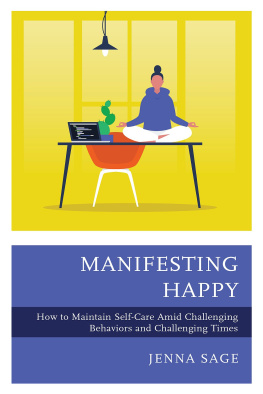
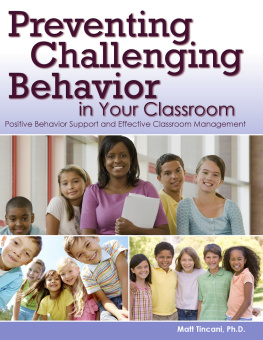
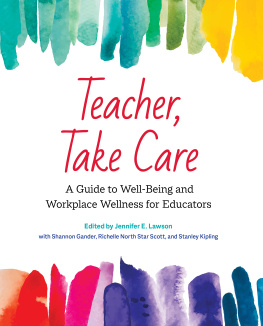
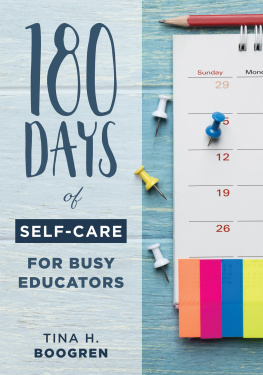
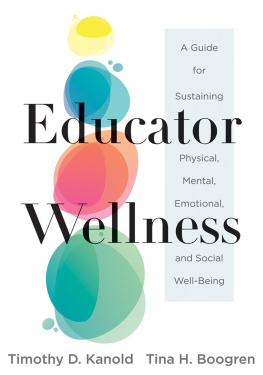


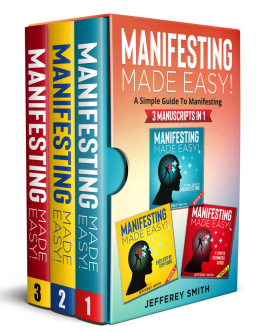


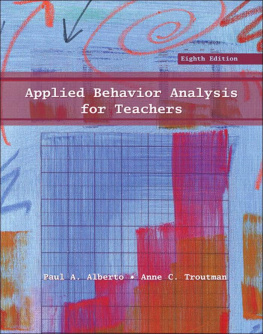

 The paper used in this publication meets the minimum requirements of American National Standard for Information SciencesPermanence of Paper for Printed Library Materials, ANSI/NISO Z39.48-1992.
The paper used in this publication meets the minimum requirements of American National Standard for Information SciencesPermanence of Paper for Printed Library Materials, ANSI/NISO Z39.48-1992.